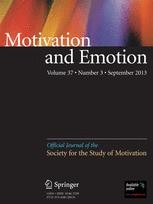Imagining a successful future can help students overcome everyday difficulties
Researchers find that disadvantaged students benefit from visualizing a positive future for themselves to manage challenges and stress
Heidelberg | New York, 24 January 2018
 Having a clear picture in mind of what their future will look like can motivate students to keep going despite the challenges of college life. This strategy seems to be particularly effective for female students from relatively low socioeconomic status (SES) backgrounds says Mesmin Destin of Northwestern University in the US. He is the lead author of a study in Springer’s journal Motivation and Emotion that looked at the role of identity-based motivation in people’s college experiences.
Having a clear picture in mind of what their future will look like can motivate students to keep going despite the challenges of college life. This strategy seems to be particularly effective for female students from relatively low socioeconomic status (SES) backgrounds says Mesmin Destin of Northwestern University in the US. He is the lead author of a study in Springer’s journal Motivation and Emotion that looked at the role of identity-based motivation in people’s college experiences.
College is a time of great opportunity for some, but can be stressful for others. It is often the first time that many students are away from the consistent and familiar support of their family and friends. Vulnerable students from lower SES backgrounds often encounter greater financial and psychological challenges than others, and this can lead to hesitation and even withdrawal from difficult situations, such as when interacting with their lecturers or taking tests and exams.
Destin and his colleagues wanted to understand if students’ responses to academic challenges improves when they look forward to the future. This idea is built around the theory of identity-based motivation. It holds that people can take positive action during times of adversity when they imagine a successful future for themselves.
“The theory of identity-based motivation proposes that activating a focus on a successful future identity may be especially powerful in motivating students who are vulnerable during challenging academic situations to develop a sense of action readiness,” explains Destin. “This involves feeling ready and able to take appropriate action when confronting difficulty.
In two almost identical laboratory experiments – one involving 93 female students, the other 185 students (including 101 women) – participants were first asked either to write about their past or their future success. After their contemplations, the participants were filmed during a mock interview with a so-called lecturer, and then had to complete a difficult academic test. The research team noted whether participants’ body language was bold and confident, and measured the amount of effort participants’ put into the academic test.
The results were consistent with the theory of identity-based motivation. Destin and his team found that having a successful future identity can prevent especially female students from lower SES backgrounds from withdrawing during challenging academic situations. Specifically, lower SES women who wrote about their future identities displayed greater action readiness compared to those who contemplated their past. They showed more confident body language. It helped them to put more effort into tackling the test, and had an indirect effect on their performance.
“Activating imagined successful future identities appears to provide a potential pathway to enable vulnerable students to effectively navigate everyday stressors,” says Destin. “The findings therefore suggest that certain students may benefit from strategies that remind them to visualize their successful futures prior to any difficult and important task that they might otherwise be likely to avoid.”
Reference: Destin, M. et al (2018). Thoughts about a successful future encourage action in the face of challenge, Motivation and Emotion DOI: 10.1007/s11031-017-9664-0
Further Information
About Motivation and Emotion
Services for Journalists
The full-text article is available to journalists on request.
Contact
Elizabeth Hawkins | Springer Nature | Communications
tel +49 6221 487 8130 | elizabeth.hawkins@springer.com
